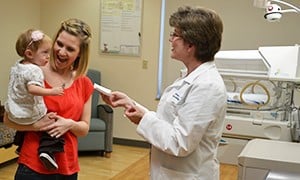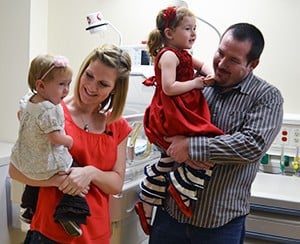Baby Thrives; Family Gives Money for Webcam
Baby Thrives; Family Gives Money for Webcam
| Emry Walker weighed 1 pound, 3 ounces when she was born March 21, 2011 at the University of Arkansas for Medical Sciences Medical Center. She wasn’t expected to make it.

Emry Walker, left, looks at Christi Palmer, M.D., co-medical director of the UAMS Medical Center’s neonatal intensive care unit after Emry handed her a check for $5,000 as her mother, Holly Walker, watches and smiles. An Angel Eye camera is visible in the upper right hand corner of the photo.
While she remained in the medical center’s neonatal intensive care unit, her father, Jeff Walker, returned to work in Fayetteville where the family resides. If Emry had been in almost any other hospital that distance from the Walker home, he wouldn’t have expected to be able to see her much at all.
Because of Angel Eye webcam technology developed at UAMS, he, his family and friends were able to see her every day from Fayetteville and other locations.
On Dec. 21, the Walkers gave $5,000 to the medical center to fund the purchase of another Angel Eye camera for the NICU. The money was raised by the Hummingbird Foundation that Jeff and Holly Walker established in late 2011 to support the families of prematurely born babies.
At about 28 weeks into her pregnancy, Holly Walker’s Fayetteville obstetrician referred her to UAMS because Emry’s growth was so slow. Because Emry’s heart rate had begun dropping, they delivered her in the 29th week by Caesarean section at the medical center.
When Emry was born, only 10 Angel Eye-equipped beds were in the UAMS Medical Center NICU. Emry was assigned to one of those about one week after her birth.

Emry, left, Holly, sister Alli Walker and father Jeff Walker visited the UAMS Medical Center’s NICU to make a $5,000 donation to the unit. .
The Angel Eye system uses a camera placed at the baby’s bedside in the NICU so that parents and other family members who can’t be at the hospital can view the baby 24 hours a day, even under dark room conditions for sleeping. It also can allow them to speak to their baby.
After more than two weeks, Jeff Walker had exhausted his time off with his employer. He had to return to Fayetteville to work and to care for his older daughter, Alli, then 2. His boss allowed him to use the Angel Eye logon to check on Emry while at his job.
“It’s a night and day difference to be able to see her, even when she was doing well,” Jeff Walker said. “A phone call doesn’t do it. It takes a load off your shoulders much more.”
Angel Eye helps promote bonding between parents and their premature babies, who sometimes have to stay in the hospital for weeks or months.
“We see that the families using this are much more comfortable with the care their babies are receiving, and they can actually see their baby receiving that care,” said Christi Palmer, M.D., co-medical director of the NICU. “It’s not just over the telephone. They actually can watch.”
They can give the logon to other family or friends who want to peek in, too.
Holly Walker periodically had to return to the family’s Fayetteville residence to help care for Alli.
“The Angel Eye bed definitely was something that got us through,” Holly Walker said. “We would all be in bed — Jeff, then Alli, then me and a laptop right beside us. If I woke up, I’d click on it and check. Sometimes the nurses would leave us little notes in the camera view saying how she was doing or to say ‘I miss you, Mommy and Daddy.’ I don’t know what we would have done without the camera.”
Because of the heavy emotional stress Emry’s condition put on the Walkers, the relief that Angel Eye delivered was even more welcome.
Emry had been expected to need a ventilator as soon as she was born, but she amazed everyone by breathing on her own.
“For us, it was one miracle after another,” Holly Walker said. “First, Emry being born and breathing, and then she also had no physical or mental complications. They all said she was a perfectly healthy baby, but she was just small. She’s just tiny. They ran every test known to man and everything came back fine. Those are just giant miracles.”
With the care she received from the medical center NICU and the support of her family, Emry slowly was able to gain enough weight. By the time she was released 89 days later, she weighed 4 pounds.
The Walkers’ donation will enable UAMS to extend its Angel Eye technology and connection to at least one more NICU bed.
“It’s wonderful when we have donations like this,” Palmer said. “They really make a big difference in the lives of the babies, the families and staff. It helps us take care of the baby when they can see the baby every day. They can feel more comfortable with the care we’re providing. We are just really appreciative of these donations.”
